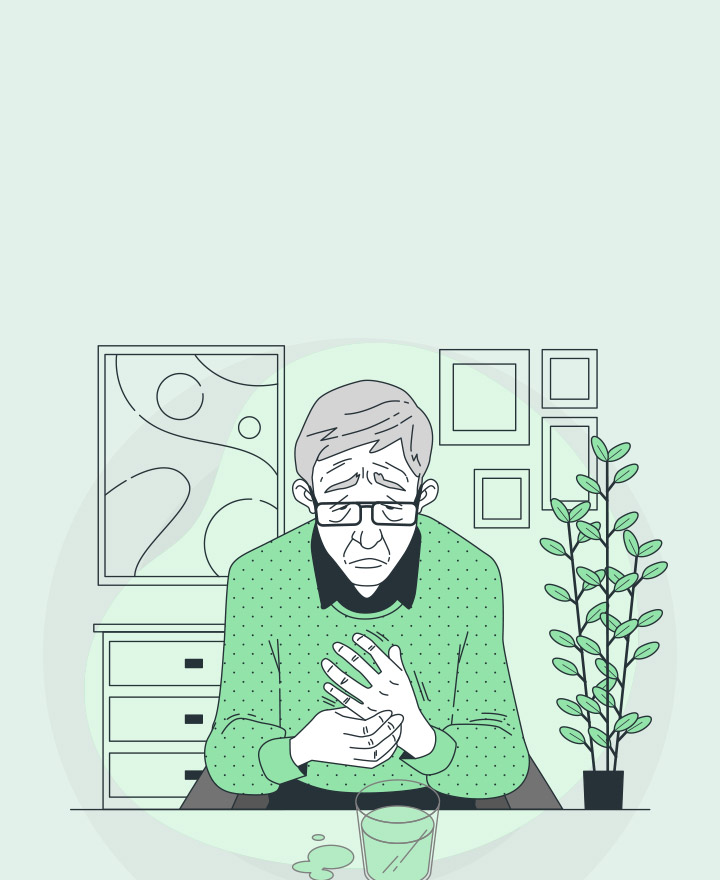

Types of Dementia
Dementia is a group of neurological conditions that causes a decline in brain function. This debilitating condition has been known to humans for centuries. There are more than 100 diseases that can cause dementia. It is a condition that affects the brain and can cause memory loss, difficulty with thinking, and other cognitive impairments. The most common causes of dementia are Alzheimer's disease, vascular dementia, and dementia with Lewy bodies. While the risk of developing dementia increases with age, it can also affect people in their 40s and 50s. When any form of dementia is diagnosed in people under the age of 65, it is referred to as 'younger onset dementia'. Let’s understand the distinct forms of dementia.
Dementia: Different Types
Dementia is not one disease but an umbrella term that includes various types. Here are the types of dementia.
• Alzheimer's disease
This is the most common type of dementia, which is a physical brain condition that impairs memory, thinking, and behaviour. It disrupts the communication between brain neurons, which affects their normal functioning. Due to a decrease in important chemicals, messages in the brain do not travel normally. People with Alzheimer's disease face various challenges and changes throughout the progression of the condition. Although the progression varies from person to person, an individual's abilities deteriorate over time.
• Vascular dementia
This is a type of dementia caused by damage to the brain resulting from restricted blood flow. This condition affects various cognitive abilities, including reasoning, planning, judgment, and attention. The changes in abilities and skills can be significant enough to interfere with a person's daily work or social functioning. It is common for vascular damage to occur alongside other brain diseases, such as Alzheimer's disease.
• Dementia with Lewy Bodies
Lewy bodies are protein deposits in the brain that cause problems with thinking, memory, movement, and sleep. They can also cause visual hallucinations and physical actions during dreams.
• Frontotemporal dementia
This medical condition causes gradual damage to either the frontal lobe, temporal lobe, or both regions of the brain. Unlike other forms of dementia, memory is typically not affected, especially in the early stages of the condition. Damage can affect behaviour, personality, language, and movement. Frontotemporal dementia is more frequently diagnosed in individuals who are younger than 65 years of age.
• Parkinson’s Dementia
Parkinson's disease patients have a 50-80% chance of developing dementia. The symptoms of dementia typically appear about 10 years after the initial diagnosis of Parkinson's. This type of dementia is quite similar to Dementia with Lewy Bodies (DLB), as both conditions share common symptoms, and Lewy bodies are found in the brains of individuals with either condition.
• Alcohol-Related Dementia
This form of dementia occurs due to the excessive consumption of alcohol. This condition adversely affects memory, learning, and other cognitive functions. Two specific types of alcohol-related brain injuries that can lead to alcohol-related dementia are Korsakoff's syndrome and Wernicke-Korsakoff syndrome.
Conclusion
Dementia is diagnosed by recognising the loss of skills and function patterns. Biomarkers can make an accurate diagnosis of Alzheimer's. Visit a healthcare professional who will review your symptoms and medical history and conduct a physical examination.
One of the important components of our overall wellness is also being financially secured. Healthcare emergencies can happen any time, but a good health insurance policy can protect you from such uncertain situations. To know more about Wellness and other health related tips, visit the Wellness Corner.
Source: dementia.org.au, alzheimers, mayoclinic, webmd
Disclaimer: This blog provides general information and discussions about health and related subjects. The information and other content provided in this blog, website or in any linked materials are not intended and should not be considered, or used as a substitute for, medical advice, diagnosis or treatment. Kindly contact your Doctor before starting a new medicine or health regime.
Related Articles
What is the Difference Between Alzheimer's and Dementia
Busting Common Myths about Alzheimer's Disease
Chronic Diseases In Seniors: How To Prevent And Manage
Common health problems in older people
Signs of Mental Health Issues among Elderly
Published on January 09, 2024














 Health Insurance
Health Insurance  Travel Insurance
Travel Insurance  Car Insurance
Car Insurance  Cyber Insurance
Cyber Insurance  Critical Illness Insurance
Critical Illness Insurance
 Pet Insurance
Pet Insurance
 Bike/Two Wheeler Insurance
Bike/Two Wheeler Insurance  Home Insurance
Home Insurance  Third Party Vehicle Ins.
Third Party Vehicle Ins.  Tractor Insurance
Tractor Insurance  Goods Carrying Vehicle Ins.
Goods Carrying Vehicle Ins.  Passenger Carrying Vehicle Ins.
Passenger Carrying Vehicle Ins.  Compulsory Personal Accident Insurance
Compulsory Personal Accident Insurance  Travel Insurance
Travel Insurance  Rural
Rural